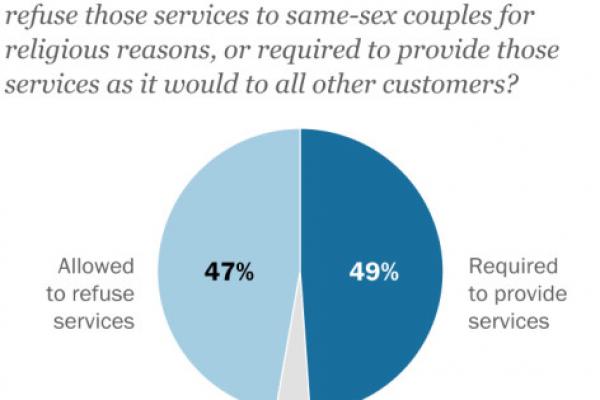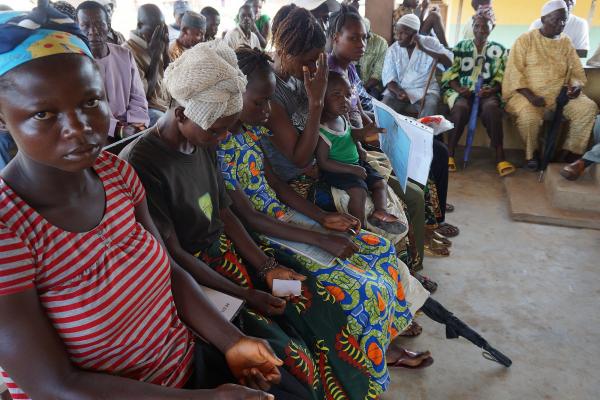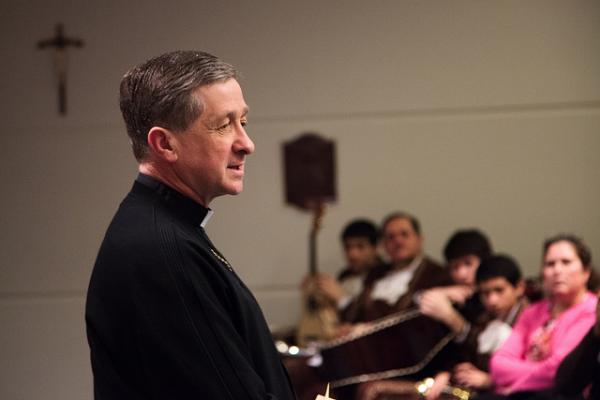More Americans today say religion’s influence is losing ground just when they want it to play a stronger role in public life and politics.
A new Pew Research Center survey finds 72 percent of Americans say religion’s influence is declining in society — the highest percentage since Pew began measuring the trend in 2001, when only 52 percent held that view.
“Most people (overwhelmingly Christians) view this as a bad thing,” said Greg Smith, associate director of Pew’s Religion & Public Life Project. “That unhappiness may be behind their desire for more religion and politics.”
Growing numbers want their politicians to pray in public and for their clergy to endorse candidates from the pulpit. And nearly half of Americans say business owners with religious objections to gay marriage should to be able to refuse wedding-related services to same-sex couples.
There are three ways to look at the findings, released Sept. 22:
Last month we went to Disney World — a perpetual feast for the senses. But. For someone like me who needs to get alone for a little daily contemplation, it can be a bit overwhelming. Except for one saving grace: It's a Small World.
I was 17, I think — and much less self-aware, I know — when I first climbed aboard the jolting, jostling little boat that would carry me to "distant shores" through the rooms filled with dolls all singing the same song. There were different languages and different clothing styles. The customs represented varied as greatly as the terrain upon which they were stationed. Some sang among mountain peaks, others on desert plains. Some bundled in parkas and earmuffs, others in grass skirts and leis.
And I don't know what it was — the change in pace from the exhilarating roller-coaster-kind-of-rides or the welcome blast of air conditioning — but there was something stilling about watching all these representatives of different peoples mouthing words to the same tune. There was a deeper message in it for that ponytailed teenager. Depths that it would take me years to plumb.
A small, small world. Indeed.
*******
Days after Maya Angelou's passing, I posted a few of her beautiful words on Facebook:
"If you must look back, do so forgivingly. If you must look forward, do so prayerfully. However, the wisest thing you can do is to be present in the present ... gratefully."
Pretty amazing words, right? What could possibly be the offense in them? Within minutes a comment popped up, the gist of which was to deny the beauty and wisdom of the words for the sake of Angelou's apparently deviant beliefs about abortion (specifically, deviant according to this commenter).
The headlines and talk shows are dominated by the response ISIS. To be clear, this group readily uses fanatical and brutal actions to achieve its radically exclusive vision. The images they skillfully project are like violent, X-rated video games made real. No wonder that many react to this horror with chills going down their spines. But there is something that worries me more: the ongoing Ebola crisis.
How did ISIS come about? Sure, there’s huge complexity. Yet, we know that ISIS never would have emerged without, first of all, the U.S. invasion of Iraq and the ensuing, devastating war that left that nation in physical, political, and psychological shambles. Second, the sectarian, Shia-dominated regime, which emerged as the final U.S. ground troops left, further radicalized Sunni extremists. These factors were the breeding grounds for black-clothed fanatics ready to cut down any who differ with their identity, even if the majority of its victims are Muslims.
ISIS’s greatest recruiting tool is continued and renewed U.S. and Western military intervention in the Middle East. That, of course, is what their brutal actions are attempting to provoke. The moral callousness of this strategy inspires the fear which they desire and welcome.
However, ISIS can and will be contained. The neighboring regimes in the region are all deeply threatened by ISIS. In the end, they will be compelled to combat and resist ISIS the more these fanatics move out of the desert and toward others’ homelands. It will be bloody, but eventually other nation states and threatened sectarian groups, representing for the most part more mainstream and globally dominant expressions of Islam, will contain and defeat ISIS. The necessity and means of outside military assistance from the West and elsewhere is highly debatable, and at the end of the day, I don’t believe this will be the decisive factor.
When Spokane Bishop Blase Cupich got a call 10 days ago with the news that Pope Francis had chosen him to be the next archbishop of Chicago — the pontiff’s most important U.S. appointment to date — he was so taken aback that he couldn’t speak for a few moments.
“To say that I was surprised doesn’t come close to the word I would use,” Cupich said Sept. 20 at a news conference in Chicago introducing him as the successor to Cardinal Francis George, who is 77 and battling cancer.
Asked by reporters how long it took for the reality of his appointment to sink in, Cupich smiled and said, “It’s still sinking in.”
A lot of other Catholics are trying to absorb the news as well, just as surprised that Francis picked the 65-year-old Cupich, who had been considered a long shot by many Vatican handicappers. They were also pleased, or concerned, that the pope had evidently chosen a bishop who shared his own emphasis on listening to the flock and caring for the poor.
“I think that he” — Francis — “sent a pastor, not a message,” Cupich told reporters.
It’s hard to follow through on our commitments. It’s hard to do what we know to be right.
We don’t need Jesus to remind us of all that. Most of us figured it out easily enough on our own.
What, then, does Jesus contribute to our understanding of what a well-lived life looks like? Can he help people of faith be agents of change, people who look at our fouled-up world and make differences that will benefit other people and will give voice to God’s desire for human flourishing?
A Parable and Its Surrounding Story
When we read about a parable Jesus tells concerning two sons -- one who verbally refuses his father’s command to work in a vineyard but later changes his mind and obeys, and another who agrees to toil in the vineyard but does not keep his promise -- we might be tempted to moralize it. We may assume its message is simply “Actions speak louder than words!” or “Don’t be such a hypocrite!” or “Obey your father!”
How boring.
How ineffective.
More serious: how inattentive to what’s going on at this point in the Gospel according to Matthew.
On September 21, Leonard Cohen Turned 80. With or Without a Cigarette, It’s Time to Celebrate.
“I hope I stay on the road a little bit longer - but you may not be so enthusiastic when you hear my reason. You see I want to start smoking next year when I'll be 80. It's been a long barren time. I think it’s the right age to recommence.” —Leonard Cohen
I dreamed you were in Florence, singing on some stage. Your back was to the men, the women by your sides. Your melody was tranquil, just humming do-re-me-fa, la-fa-re-me-do. And when there was commotion, some men quarreling behind the scene, you turned and faced them calmly, beseeching, “Gentlemen, let’s sing.”
You have left us these past months, ceased your universal tour. It gives us time to miss you, and wonder what you mean. This week you will be eighty, there’s no question, you are old. Your bones may creak or ache and I’ll guess your heart’s a little tired, but from outside looking in you seem settled in a pretty gentle space.
So in the dream your melodies kept coming, like a river from its source. “You’re doing it,” someone shouted. “It’s exactly what we want!” People were casually swaying until your voice started to get hoarse. “Well, I’m glad you like it,” you croaked joyfully, “I call this solemn mingling my little Florentine Prayer.”
If you’ve been reading our blog or have checked your iTunes last week you’ve noticed the power couple of Steve Jobs’ ghost and Bono working together again. (Anyone rememberthe U2 iPod?) I’ll leave it up to music critics to debate the musical quality of the album and the potential violation of the now infamous iCloud downloading music for each Apple user. But there is one other issue to discuss regarding the U2’s recent release: God.
In a recent article published by The New Yorker, author Joshua Rothman takes an in-depth look into the spirituality of what some would call the world’s most popular rock band. Throughout the years, Bono’s religious roots have not been a secret. Books such as Get Up Off Your Knees: Preaching the U2 Catalog and We Get to Carry Each Other: The Gospel according to U2 have been published within the last decade. The Archbishop of Canterbury has addressed Bono in lectures and Bono has preached at the National Prayer Breakfast.
One of the most interesting aspects of Rothman’s article was the citing of “churches around the world celebrating U2charists.” Churches as far as the Netherlands, Austria, Mexico, and as close as Iowa, Baltimore, and Maine have celebrated U2charists, a communion service accompanied by U2 songs in lieu of traditional hymns. Rev. Paige Blair, of St. George’s Episcopal Church of Maine, was one of the first religious leaders to host such a service. According to Rev. Blair:
“the liturgy itself is pretty traditional — it has all the usual required elements: a Gospel reading, prayers, and communion from an authorized prayer book. The music is really what is different. And yet, not so different. It is rock 'n roll, but it is also deeply and overtly spiritual.”
Andrew W.K. at the Village Voice received a question from someone whose brother was diagnosed with cancer. In his grief, he is frustrated by his grandma’s prayers and sees them as “superstitious nonsense.” Andrew’s brilliant response is a very worthwhile read, in which he positions prayer as a posture of humility, a deep realization of our smallness.
When senseless tragedy occurs, people of faith often rush to explain and control. As finite human beings, we are limited in our knowledge and power, which makes us uncomfortable. When we encounter something incomprehensible, we are driven to explain it. When a situation reels out of control, we long to control it. We invite God to fill those gaps of our discomfort, our lack of understanding and control.
We look for redemption stories, the ways God is bringing about good through a tragic situation. We do this to avoid letting the grief overwhelm us. Like grandma, we pray because we are hoping to claim some power in our helplessness. Our prayers end up being more beneficial for ourselves than the person we are actually praying for.
Unfortunately, what happens then is we cease to need God beyond the quick explanation. We’ve tidied up the situation with reverent prayers and spiritual meaning. We’ve quickly salvaged the ecosystem of our faith despite a tragic intrusive incident — our belief in the God of the gaps remain intact. Everything stays the same. When we do this, we are making God into an idol, one that explains and controls according to our sensibilities.
Midnight. 80 degrees. Palm trees, illuminated by the airport lights, lining the street. My dream was now a reality. Germany to Miami. I did it. I moved to America!
When I was 12, my family vacationed in upstate New York. From then on, I knew I wanted to live in America. When other children dreamed of becoming policemen, rock singers, and cowboys, my perpetual childhood dream was to become an American. I devoured books by German author Karl May, about an Apache warrior named Winnetou. His pride and honor started my fascination with this country.
I was 16 when I finished school in Germany, 17 when I finished school as an exchange student, and was 20 when I moved to Miami. I fell madly in love and we moved to Los Angeles. After some time, we moved to Detroit and got married. Then we broke up.
The breakup forced a brief pause as I unwillingly moved back to Germany to reset my visa. Before I left Detroit, I had set up an interview with another freight forwarder in Hamburg, under the condition that they would send me back to the U.S. I never, ever gave up on America — it was never, ever a consideration. Within ten days of arriving in Hamburg, I was at my new job at the German Freight Forwarder. Ten months later, I was back to my America — assigned to Houston.
When they moved me to Atlanta, I remarried. He was a contractor, and I quit my freight job so we could renovate houses together. Unfortunately, the relationship didn't work out. I thought I didn't need to worry about the visa situation because I was married to a U.S. citizen. Had our relationship worked out, I would have been on track for a temporary green card. I was single again, so I was in violation of my H1B visa — and of the five companies in Atlanta that I could have worked at, none of them had job openings.
I found a glimmer of hope — maybe I could switch to an entrepreneur visa. I quickly found an attorney to take my case, but later found out that he never filed anything.
On Sunday, Noah's Ark will be rolling through the streets of New York City.
Powered by a bio-diesel truck and paid for by faith-rooted climate activists, it will drive on Manhattan’s West Side alongside hundreds of thousands of climate activists calling for climate justice.
The ark appeared in a collective dream with other faith-rooted activists and organizers about how our wisdom traditions could speak to this urgent moment with radical creativity and dramatic flair.
The same old calls for action aren’t getting through. We don’t have much time to act, yet our world leaders lurch from crisis to crisis while the frog slowly boils in the pot. We are living through one of the greatest extinction in our planet’s history. And even if we did survive the Earth’s death by some technological miracle, what kind of life would that be?
We must help people see that climate disruption is real and that there are solutions. We need to help the media and our political leaders see this movement as truly multiracial, multigenerational, multifaith, and of many economic backgrounds.









